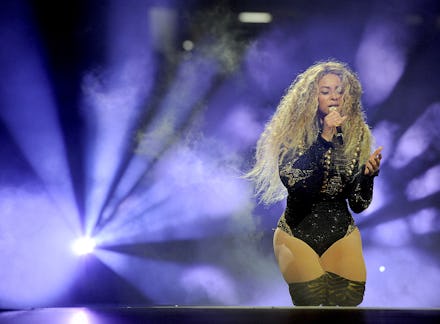The One Reason Why Beyonce Needs to Stop Endorsing Pepsi

Roughly 12.7 million children and teens in the United States are obese. What's not helping? Celebrities signing on to billion-dollar deals to promote soda and sugary foods.
A study published Monday from New York University found that a majority of music celebrities featured in food advertisements are promoting "energy-dense, nutrient-poor" foods. In other words, the biggest names in music are hawking junk food, not quinoa or nutrient-dense food, to impressionable youngsters.
From promoting clothing, fragrances, makeup, or restaurants, famous musicians have ample opportunity to make some extra dough. Yet, many of them are getting into bed with unhealthy brands that harm their valuable fans.
The study: By examining the US advertising industry database from 2000 to 2014, researchers found 65 celebrities who had promoted, either explicitly or implicitly, 57 different food and drink brands. Promotions included: radio, TV, and magazine ads as well as participation in concerts sponsored by a certain food product. Food and drink endorsements represented 18% of all 590 endorsements made by celebrities in the study sample.
Here's where it gets icky: Roughly 71% of non-alcoholic beverages promoted by celebrities were "sugar-sweetened." Think: Beyonce and Nicki Minaj sipping on Pepsi, or Justin Timberlake crooning for McDonald's. Plus, 80.8% of the foods endorsed were deemed "energy dense and nutrient-poor" according to the Nutrient Profile Index used in the study.
One notable exception in the study was a promotion by South Korean pop star Psy, who had a pistachio industry ad spot in the 2013 Super Bowl. Ah, yes. Remember Psy?
Food marketers intend for viewers to see Bey sipping Pepsi and connect the beverage with her enviable bod, but that connection is far from reality. A 12-ounce can of the stuff packs a whopping 40 grams of sugar. And diet cola won't do you any favors, either. Though it has fewer calories, diet colas contain artificial sugars that can trick your taste buds into consuming more calories in the long run, according to a study from John Hopkins University.
"Endorsements allow food companies to connect their products with some of kids' biggest heroes in music and sports, building brand loyalty for years to come," Laura Nixon, Media Researcher at the Berkeley Media Studies Group, said via email.
She noted that companies shell out millions of dollars to celebrities for endorsements because the endorsements are effective in getting kids' attention.
With the star power of music celebrities and top athletes, soda brands can reach millions via social media.
Kids are one of the easiest targets for advertisers. While an adult can often recognize that a product placement is advertising, Nixon said research suggests that children don't understand the persuasive power of advertising until they're roughly eight years old.
And using celebrities to win kids isn't the only trick in the book. Food marketers also use favorite TV or movie characters — known as licensed characters — to market unhealthy foods, Nixon said.
One notable exception to the sugar-fueled norm: NBA star Stephen Curry inked a recent deal to endorse Brita-filtered water. Even though Brita is still out to make a buck off of its filter systems, it's nice to see a high-profile celebrity associated with a drink that's much healthier than soda.
Curry also endorses "FNV," a campaign to "brand" fruits and vegetables and market them just like other snacks and food products. Stars including Jessica Alba, Nick Jonas, Cindy Crawford, Gronk, Megan Rapinoe, and Michelle Kwan are in on the plot to promote FNV, according to the site.
And while Beyonce repping a "Kale" sweatshirt in a music video is admirable, it's doubtful that one article of clothing, among other relatively low-profile vegetable promotions from Bey, can balance out the massive influence of her multi-year, $50 million Pepsi deal.
Celebrities claim they owe their fame to fans, yet they are, more often than not, promoting harmful food and drink.
Join us in dreaming of an alternate reality where Katy dances in a veggie paradise instead of a candy wonderland in her next hit music video. Because California gurls eat kale salad and yogurt in real life, anyway.